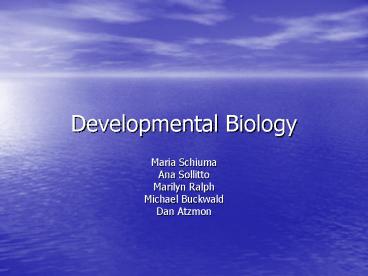Developmental Biology PowerPoint PPT Presentation
1 / 13
Title: Developmental Biology
1
Developmental Biology
- Maria Schiuma
- Ana Sollitto
- Marilyn Ralph
- Michael Buckwald
- Dan Atzmon
2
Introduction
- It has been said that what separates modern
man from all of our predecessors is our
imagination and curiosity our ability to look
into the swirling abyss and ponder what lies
beyond. It is this very same innate curiosity and
imagination that virtually compels us as a
species to question our own origins and those of
the creatures around us. In this search for an
answer to the question of from where we came,
many theories have been suggested and almost as
many have been readily disproved. Yet Charles
Darwins Theory of Evolution has survived and
flourished supported by an ever broadening
array of scientific evidence, including that
garnered through studies of developmental
biology. - By carefully examining and comparing the
way organisms grow and develop, developmental
biology provides unique opportunities for
scientists to view the conditions under which
certain ancestral relationships and biological
processes evolve and thus pushes us closer to the
end of our ongoing quest for an answer to the
ever-present questions of our most fundamental
origins.
3
Important Terms
- Developmental Biology a field of biology that
studies the way organisms grow and develop and
then compares these methods to those applied by
similar organisms in order to understand how
certain processes and relationships have evolved.
- Developmental Biologist One who actively
studies and pursues studies pertaining to
developmental biology. - Embryology the study of organisms during their
early stages of development. Careful study of
Embryology can shed significant light on the
various relationships between fully developed
organisms. - Morphogenesis a category encompassing all of
the processes that give rise to tissues, organs
and structural anatomy. - Evolution the Darwinian process of change
arising in certain populations through successive
generations as a result of natural selection
acting via mutations to bring about gradual
changes. - Homologies Similarities in biological structure
arising from ancestral evolutionary ties.
4
Comparative Embryology
- Key tool used by evolutionary biologists to prove
evolution - Compares developing embryos in all stages of
development of different species - Stages of development are analogous to evolution
- If embryos of two species are similar in just
early stages, then their evolution diverged at an
earlier stage - Animals with similar embryonic development have
very similar characteristics - i.e. same kingdoms, phylum, etc.
5
Descriptive Embryology
- Study of the normal sequence of events in the
formation of organs during the embryonic period
in different organisms - Can relate the developing processes of each
species to see if any similarities occur,
therefore showing a connection in evolution - The normal sequence of events for most mammals
is - Progress through cleavage, blastula, and then the
gastrula stages - Neuralation
- Brain starts to develop
- Spinal Chord
- Heart
- External body structures eyes, ears, limbs
- Internal Organs
- Produces own blood
- Becomes motile
- When studying developing embryos, scientists
discovered several causes for birth defects such
as spina bifida and anencephaly both occur when
abnormalities arise in the neuralation sequence
of development
6
(No Transcript)
7
(No Transcript)
8
Evidence for Evolution
- Does human embryonic development mirror
evolution? - Embryonic recapitulation human embryo develops
in steps that retrace evolution by showing the
stages ancestors went through - Ontogeny recapitulates phylogeny - Haeckel
- Vestigial organs structures that were functional
in the past but have now lost their function - (yolk sac, gill slits, tail)
- Moral issue abortion
9
(No Transcript)
10
Human Embryonic Development
11
Chemical Homologies
- Uses DNA
- Pseudogenes Junk DNA
- The more the sequences of two animals differ, the
more remote (both in relatedness and in time) is
their common ancestor - The more related two animals are in Linnean
Classification System, the greater chemical
homologies
12
DNA and Evolution
- Vertebrates have DNA homologies, ex. portions of
Hemoglobin gene - Human and Chimp DNA differs less than 1.7,
coding regions less than 0.4 - DNA hybridization used to test
- Believed that humans branched off of chimp
evolution
13
Division of Labor
- Maria PPT, Evidence for Evolution
- Ana Chemical Homologies
- Marilyn Descriptive Embryology
- Michael Introduction, Important Terms
- Dan Comparative Embryology

